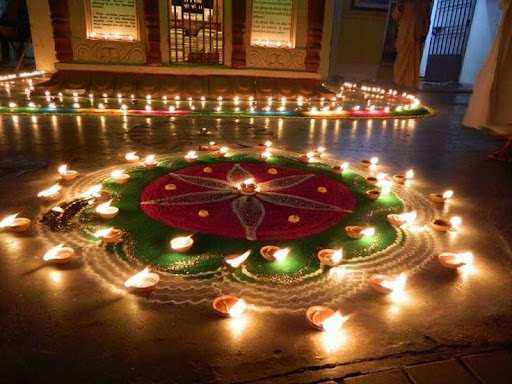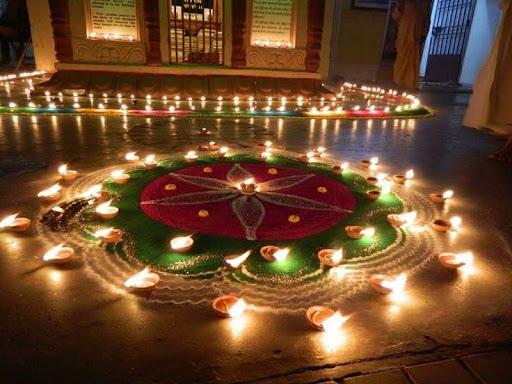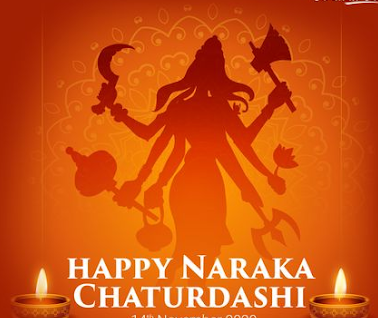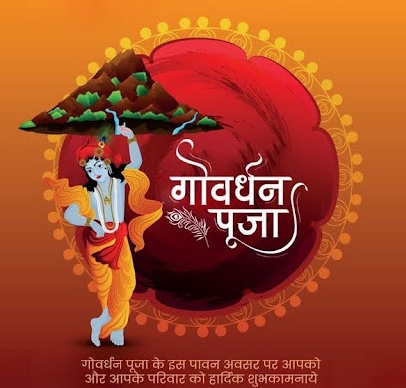Diwali- A Celebration of lights and Rituals
 Dharmik
Dharmik
During Diwali, the Festival of Lights, a set of rituals and rules is carefully followed to maintain the sanctity of the celebration. These practices, deeply rooted in spirituality, are designed to bring prosperity, joy, and positive energy into homes. Let’s explore the various rituals observed across India, as well as the traditions that guide people during this festive period.
Rituals and Traditions of Diwali
1. Cleaning and Decoration
The preparations for Diwali begin days before the main event. A key ritual involves cleaning homes thoroughly to welcome Goddess Lakshmi, the deity of wealth and prosperity. It is believed that the goddess enters homes that are clean and organized. This practice signifies the removal of past negativity and the invitation of good fortune. Homes are then adorned with beautiful rangoli designs, made from colored powders or flower petals, and lit up with oil lamps (diyas) to dispel darkness and ignorance.

2. Dhanteras – Welcoming Wealth
The Diwali festivities commence with Dhanteras, the first day of the festival, which is dedicated to honoring Goddess Lakshmi and Lord Dhanvantari, the god of health. On this day, it is considered auspicious to buy new items, especially gold, silver, or household utensils. This ritual symbolizes the attraction of wealth into one’s life. Diyas are lit to drive away evil spirits, and prayers are offered for prosperity and well-being.
3. Naraka Chaturdashi – The Day of Cleansing
The second day of Diwali, Naraka Chaturdashi (also known as Choti Diwali), marks the triumph of Lord Krishna over the demon Narakasura. In South India, this day starts with an early morning oil bath, symbolizing purification of the body and soul. People also wear new clothes as a sign of renewal and celebrate with sweets and firecrackers. This ritual serves as a reminder to cleanse oneself physically and mentally before stepping into the main Diwali day.

4. Lakshmi Puja – Invoking Prosperity
The third day of Diwali is the most important one, when Lakshmi Puja is performed. Families prepare by cleaning the house and decorating the altar with flowers and diyas. During the puja, Goddess Lakshmi, Lord Ganesha (the remover of obstacles), and Lord Kuber (the god of wealth) are worshipped. Offerings of sweets, fruits, and flowers are made to seek blessings for wealth, happiness, and success. Homes are lit up with diyas and candles to guide Goddess Lakshmi into their homes, ensuring prosperity for the coming year.
5. Govardhan Puja – Gratitude for Nature
The fourth day, Govardhan Puja, is observed primarily in North India to celebrate Lord Krishna’s protection of the people of Vrindavan from torrential rains by lifting the Govardhan Hill. Families create small hillocks made from cow dung or food items to represent Govardhan and offer prayers of gratitude to nature and the sustenance it provides. In some parts of India, it is also celebrated as Annakut, where devotees offer large quantities of food to the deities as a form of thanksgiving.

6. Bhai Dooj – The Bond of Siblings
The final day of Diwali is Bhai Dooj, a celebration of the special bond between brothers and sisters. On this day, sisters apply tilak (a ceremonial mark) on their brothers' foreheads and perform aarti for their long life and protection. In return, brothers give gifts to their sisters as a token of love. This day strengthens familial bonds and celebrates the enduring love between siblings.
Rules and Practices During Diwali
During Diwali, several customs and practices are followed to ensure a harmonious and positive celebration:
1. Avoiding Inauspicious Activities
During Diwali, inauspicious activities such as arguing, gambling, or engaging in negative talk are strongly discouraged. The festival is a time to maintain peace, joy, and positivity, as the vibrations created during this period are believed to have long-lasting effects. Family disputes or conflicts are best avoided to allow the flow of prosperity and harmony.
2. Maintaining Cleanliness
It is essential to keep both homes and public spaces clean during Diwali. This not only ensures a welcoming environment for Goddess Lakshmi but also encourages good hygiene and health. The practice of cleaning extends to the mind as well—people are encouraged to let go of grudges and negative thoughts, making room for positivity and renewal.
3. Offering Prayers with Devotion
Puja rituals during Diwali are performed with utmost sincerity and devotion. When worshipping Goddess Lakshmi, Lord Ganesha, or other deities, it is important to maintain a peaceful and focused mind. Many families follow specific timings for Lakshmi Puja and ensure that the ritual is carried out with the proper offerings and recitations.
4. Sharing Joy and Helping Others
The spirit of Diwali also emphasizes sharing and giving. Families distribute sweets to neighbors, relatives, and friends, fostering goodwill. Many also engage in charitable acts, donating clothes, food, or money to those in need. This act of kindness not only aligns with the festival’s message of light but also spreads positivity in the community.
Dharmik App: Merging Tradition with Technology
In today’s fast-paced world, maintaining traditional practices can be challenging, but technology has become an enabler of spirituality, especially during important festivals like Diwali. Dharmik, a FaithTech platform, offers an innovative solution by bridging the gap between tradition and modern lifestyles. Through the app, users can connect with their faith more easily and meaningfully by accessing religious services, live darshans, and virtual temple visits.
For those who may not have the opportunity to visit temples or perform elaborate rituals, Dharmik App allows them to participate in Diwali pujas from anywhere, maintaining the sanctity of the festival. It provides users with a way to uphold their spiritual practices without compromising on the demands of their modern lives.
Conclusion
Diwali is a festival that blends tradition, spirituality, and community. The various rituals, from cleaning homes to lighting lamps, and the prayers offered to deities, all carry deeper meanings that extend beyond the physical celebration. They signify a spiritual renewal, the embrace of light and goodness, and the sharing of joy with loved ones.
As technology reshapes the way we interact with our faith, platforms like Dharmik App ensure that even in a digital age, the essence of these age-old rituals remains intact. Diwali, after all, is not just a festival but a reminder of the light within each of us, and the shared responsibility to spread that light in the world.
Subscribe to my newsletter
Read articles from Dharmik directly inside your inbox. Subscribe to the newsletter, and don't miss out.
Written by

Dharmik
Dharmik
Dharmik is India's premier religious App, offering a cherished experience for Hindu devotees. Seamlessly book Online Puja and receive the divine Prasad. Your spiritual journey begins with Dharmik, where tradition meets technology.